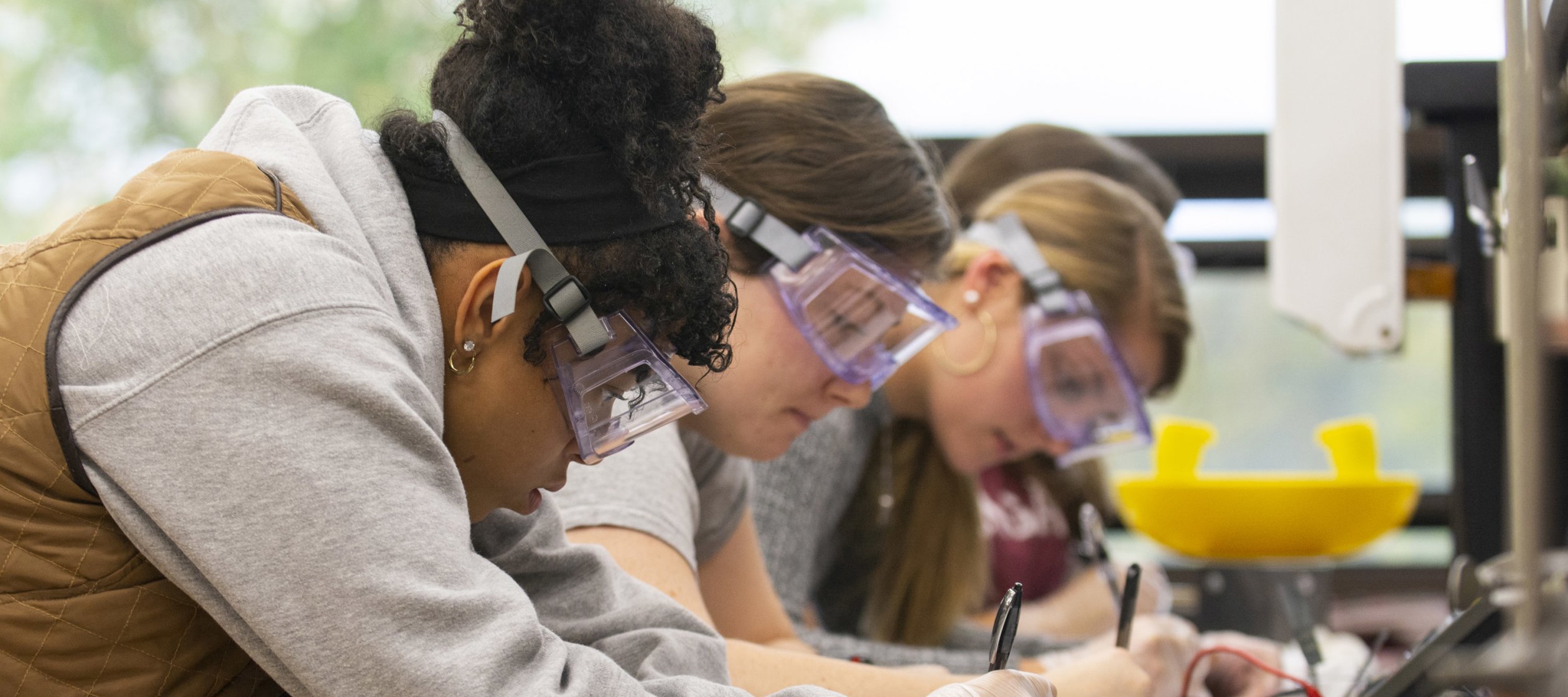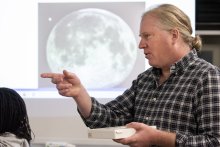

Pathways to Achieving STEM Success (PASS)
The Pathways to Achieving STEM Success (PASS) program is a small cohort of academically talented scholars receiving support programming as part of their Utica University experience.
Please Note: This program is no longer accepting new applicants.
Utica University and the PASS program are committed to recruiting talented scholars that have financial need. The program provides students majoring in Animal Behavior, Biochemistry, Biology, Chemistry, Geoscience, or Physics with financial assistance in the form of a scholarship in addition to a wide variety of support programming. For example, there will be a special STEM orientation before you start in the fall to give you a head start on your undergraduate experience, and a two-semester STEM-focused first-year seminar to help you succeed and thrive in your first year as a STEM major. You will receive guidance from a cadre of advisors and mentors, participate in workshops for career and graduate-school preparation, attend research-focused STEM talks, visit STEM industries through field trips and special tours, and engage in mentored research projects with your research advisor. These experiences, combined with a scholarship and other enhanced student supports, will help you build your STEM community at Utica University and aid you on your path to becoming a professional scientist.
This program is supported by the National Science Foundation under grant no. DUE-2030447.
The PASS program objectives include:
- Recruiting and enrolling academically talented scholars with financial need who are majoring in Animal Behavior, Biochemistry, Biology, Chemistry, Geoscience, or Physics;
- Retaining 85.7% of scholars in their majors from the first to second year;
- Graduating at least 71.4% of scholars with STEM degrees in four years, and through a scholar replacement process, graduating a total of 14 scholars with STEM degrees; and
- Among scholar STEM graduates, placing at least 13 (92.9%) into post-baccalaureate STEM programs or direct employment in STEM within six months of graduation.
Please Note: This program is no longer accepting new applicants.
Utica University’s PASS Project Management Team will identify candidates who meet NSF S-STEM eligibility criteria, including: (1) U.S. citizen, permanent resident, national, or refugee status; (2) enrolled in a baccalaureate degree in Animal Behavior, Biochemistry, Biology, Chemistry, Geoscience, or Physics; and (3) demonstrated financial need.
- Academic Merit: Utica University’s Admissions office will conduct an initial screening of incoming applicants to determine academic eligibility for the PASS program. Utica University is a test-optional institution that uses a holistic admissions process to foster a more diverse and equitable environment. If opting out of the SAT or ACT, applicants will have additional factors considered, including class rank, leadership, writing ability, and promise of contribution. All eligible PASS applicants must have a minimum high school GPA of 88 out of 100. Test scores may be factored into the ranking; if they are, they include a minimum score of 24 on the ACT or a minimum of 1150 on the SAT.
- Financial Need: An applicant who is Pell-eligible, as determined by the FAFSA, meets the PASS program’s definition of financial need. Questions about financial eligibility should be directed to Financial Aid Services through the Center for Student Success.
Scholarships will average $7,000 per year and will be paid in two installments, at the beginning of each semester. Prior to disbursements, sophomore through senior scholars must be recertified as eligible. Criteria for maintaining eligibility will include continued unmet financial need, a minimum GPA of 3.0 out of a 4.0 scale both overall and within the major, satisfactory program participation, and continued enrollment in one of the selected STEM majors: Animal Behavior, Biochemistry, Biology, Chemistry, Geoscience, or Physics.
If academic eligibility criteria are not met, the scholar will meet with members of the Project Management Team, create an action plan to address the area of weakness, and be allowed a one-semester probationary period to correct the cause(s) of ineligibility. During the probationary period, the scholar will be required to meet bi-weekly with their faculty advisor to discuss progress, and every effort will be made to assist the scholar in regaining eligibility. If, after the probationary period, the scholar does not show improvement, nor regain eligibility, the scholar will be replaced by a student on the waiting list from the same matriculating cohort.
Admitted students invited to submit a PASS application must: (1) meet the aforementioned academic and financial need criteria, and (2) express the intent to major in Animal Behavior, Biochemistry, Biology, Chemistry, Geoscience, or Physics. Applicants will be required to submit an application to the PASS program, including a short essay describing the student’s field and careers of interest, helping the Project Management Team confirm an intention to contribute to STEM fields rather than health professions. Two letters of recommendation will specify candidates’ ability, interest, and motivation. The extended deadline for submitting application materials is June 30, 2022. The committee will follow up with virtual or in-person interviews (depending on student location) with the strongest candidates. Awardees will be notified in early July.

PI: Thomas M. McCarthy, Ph.D., Distinguished Professor of Biology. Dr. McCarthy’s research focuses on behavior, ecology and evolutionary biology of invertebrates. In addition to his scientific research, he served as reviewer for select chapters of forthcoming editions of textbooks in the fields of ecology and invertebrate zoology. He is a faculty contributor to Utica’s CSTEP program.

Co-PI: Sara Scanga, Ph.D., Professor of Biology. Dr. Scanga is a plant ecologist with research interests in rare plant conservation, forest responses to long-term changes in atmospheric pollution, and invasive species. With her students, she participates in three Ecological Research as Education Network (EREN) research projects and a Joint EREN-NEON (JEN) project, funded by NSF. She is a board member of EREN and a member of the Eugene P. Odum Award for Excellence in Ecology Education Subcommittee of the Ecological Society of America. She is Co-PI on an NSF EREN grant.

Co-PI: Michelle Boucher, Ph.D., Professor of Chemistry. Dr. Boucher’s research focuses on organosilicon chemistry, specifically the modification of naturally occurring sheet silicates as reinforcement or alignment tools. She also has a strong interest in chemistry education, recently authoring a chemistry instructor’s guide (Boucher, 2017) and a book chapter on co-curricular service learning through the development of instructional labs (Boucher, 2018). She chairs Utica’s Undergraduate Programming Advisory Board and is the CSTEP faculty advisor.

Co-PI: Adam Schoonmaker, Ph.D., Professor of Geology. Dr. Schoonmaker's research is focused on interpreting the tectonic history of mountain belts in the Northern Appalachians and Klamath Mountains (Oregon) through stratigraphic and structural interpretation, geochemistry of lavas, and geochronology. His students sometimes travel to these locations to conduct research, while others work locally in multiple areas of geophysics and hydrology.

Co-PI/STEM Administrator: Sharon Wise, Ph.D., Dean of Natural Sciences and Math and Distinguished Professor of Biology. Dr. Wise's research interest is broadly in the area of behavioral ecology. Primarily, she has conducted studies using lower vertebrates, particularly reptiles and amphibians. Most frequently, she has studied the terrestrial red-backed salamander, Plethodon cinereus; a species that is abundant in mature, eastern forests throughout North America.
Social Science Researcher: Karen Yanowitz, Ph.D., Professor of Psychology at Arkansas State University, will consult for this project. Dr. Yanowitz is a psychologist who researches STEM education and pedagogy. She has evaluated several STEM education programs and served as PI on NSF ITEST CSI: Classroom Student Investigations grant programs from 2006 to 2017 (#0624440 and #1031679).
Contact Us
Thomas M. McCarthy, Ph.D.

Thomas M. McCarthy, Ph.D.
Principal Investigator, Professor of Biology
(315) 223-2510
I would like to see logins and resources for:
For a general list of frequently used logins, you can also visit our logins page.
